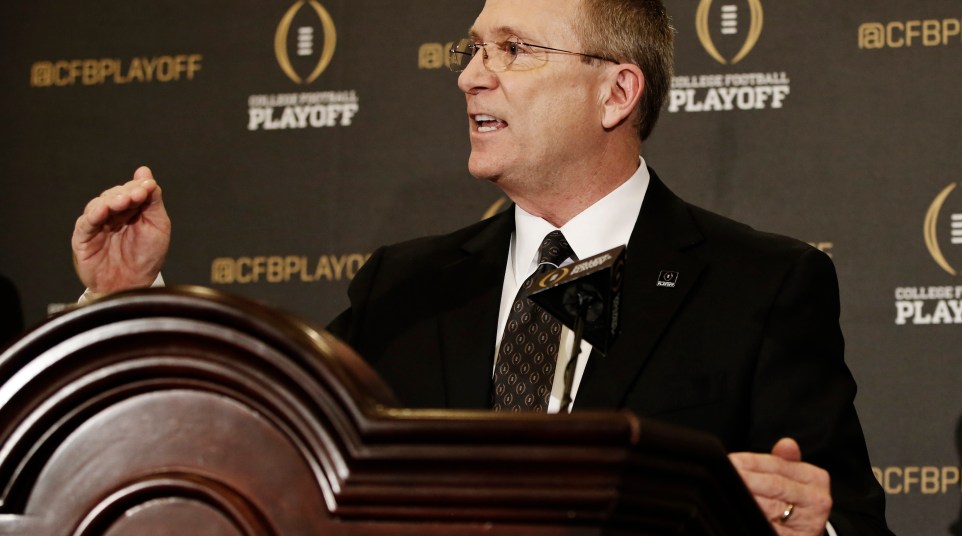How do first CFP rankings compare to a BCS simulation?
Last night, the College Football Playoff Selection Committee released its first ever rankings, including three SEC teams in its Top 4 spots — the spots designated for the committee’s four playoff teams.
There are still five weeks left in the regular season plus a weekend of conference championship games to follow, so there is certain to be plenty of shakeup in the CFP rankings between now and then. Tuesday night’s poll release was more about insight into the committee’s approach to the rankings than it was about the rankings themselves, and we certainly learned a lot from the first set of rankings this week.
But, of course, it’s tough to know where you’re headed without knowing where you came from. As 2014 ushers in a new four-team playoff system, it also does away with the highly controversial BCS system as the former method for selecting national championship participants.
How does the CFP compare to the BCS? One website — BCSKnowHow.com — attempted to answer that question Tuesday night when the committee’s rankings were released. The site produced a side-by-side comparison of the CFP Poll and a BCS simulation based on the old formula that once controlled the college football world.
Here are the findings:
Full top 16 comparison between first @CFBPlayoff rankings and what the #BCS would have looked like after Week 9: pic.twitter.com/B0J5ZAHlE3
— BCSKnowHow.com (@BCSKnowHow) October 28, 2014
Let’s begin with the obvious: if we were still living in the BCS era, last night’s rankings release would have had far less pomp and circumstance than the release of the CFP Poll. Mississippi State and Florida State both remain unbeaten as members of power five conferences (sorry, Marshall, but play someone we’ve heard of), and as the BCS simulation shows us they were obvious choices for the national championship game.
The BCS is only meant to determine the two best teams, not the Top 4 like the CFP. Until either the Bulldogs or Seminoles lose, that hypothetical title matchup won’t change, which sucks a lot of the fun out of the BCS, especially for fans of teams like Auburn, Alabama, Ole Miss, Oregon, TCU, Notre Dame, Michigan State, etc.
But let’s look beyond the top two of the BCS, or imagine either MSU or FSU lost to reopen the field. How are the CFP and BCS rankings similar? How do they differ?
The two rankings both feature the same top six teams, including four teams from the SEC West, but the order of those six teams differs.
The CFP clearly valued strength of schedule in slotting the SEC West teams, giving an edge to Auburn and Ole Miss ahead of Alabama in the poll. Auburn has the best non-conference win of the bunch on the road against Kansas State, and it has the best loss of the one-loss teams to No. 1 Mississippi State in Starkville. Ole Miss also boasts an impressive resume with wins against Alabama and Texas A&M and one loss to LSU at night in Death Valley.
Alabama lost to the Rebels and has yet to play Mississippi State, LSU or Auburn, and the lack of tough competition on its early season schedule cost the Tide a Top 4 spot in the CFP Poll.
The BCS, meanwhile, did not factor strength of schedule into its unforgiving formula, which is why you see Alabama ranked ahead of Auburn and Ole Miss, and why you see teams like TCU, Michigan State and Kansas State ranked behind of a Notre Dame squad yet to beat a ranked opponent in 2014.
The committee has already moved away from the former computer-based selection process and made the most of the human element used to determine the playoff field. The committee members didn’t just look at wins and losses, but looked at how a team won or lost. They looked at things like injuries, home-field advantage and momentum, and used an “eye test” the BCS formula never could.
There will never be a set of rankings we can all agree on, but we can all agree the CFP is a much better method of deciding the playoff field than the BCS was. It will be fascinating to see how the CFP Poll changes week to week the remainder of the season, and it will be equally interesting to see how the BCS simulations evolve over the next month.
For now, there is no hypothetical BCS controversy due to an obvious top two, but if that changes, I think we’ll find the CFP handles a logjam at the top of the rankings better than the BCS ever could.
After all, it’s humans who watch the games, not computers.

